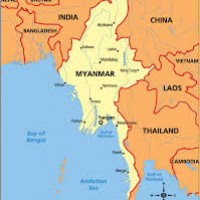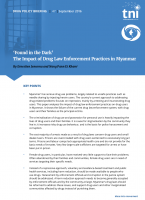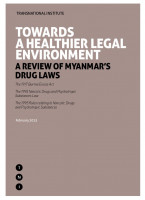Women and drugs in Myanmar: Beyond harm reduction A Myanmar Commentary
In Myanmar’s Kachin State, a women’s drop-in centre has transformed into more than just a harm reduction facility. Leading up to International Women’s Day, we spoke with Thinzar Tun (AHRN Myanmar) about what makes this centre special.
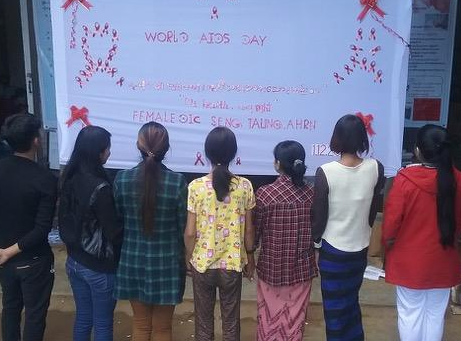
For decades, the war on drugs has negatively impacted millions of lives. It has led to damaging forms of marginalisation, alarming rates of incarceration, and a wide array of ‘unintended consequences’ of drug control policies, from corruption and injustice to violence in illicit markets. In most parts of the world, for reasons related to broader gender inequality, women are disproportionately affected by these policy impacts at varying levels. It is only recently that this issue has begun to receive particular attention within the world of drug policy activism.
The more we dig in, the more we learn about - and are sometimes enraged by – the various harsh repercussions of drug control policies on the lives of both men and women worldwide. Nevertheless, as thousands have been empowered by the blossoming of the #MeToo movement, it is important to acknowledge that change is possible, and that concrete efforts can lead to progress that is worth celebrating.
Applauding local efforts in MyanmarLeading up to International Women’s Day 2018, we spoke with Thinzar Tun, Program Director at the Asian Harm Reduction Network (AHRN) Myanmar, to discuss her work at an AHRN-facilitated drop-in centre in Kachin State, Myanmar. Established in November 2010, this drop-in centre (DIC), which locals refer to as Amyothamee Nar-Ko-Yar (meaning: “a place to chill out or relax”), is specifically designed for (and largely run by) women who use/inject drugs.
Unlike most drop-in centres in Myanmar, the scope of this women-friendly DIC goes well beyond the nine core practices of harm reduction, which range from needle and syringe programmes to TB screening and treatment. Located in Seng Taung-Hpakant Township, this DIC provides not only harm reduction services, but also integrated primary health care and reproductive health services such as family planning, pre/post-natal care including referral for women who require special medical treatment to hospital for child delivery or miscarriages. Besides distributing needles, syringes, and condoms, the centre also offers psychosocial counselling for both individuals and couples, to promote open discussions between partners about safer practices of sex and drug injection.
Annually, this DIC serves about 500 to 600 women who use/inject drugs, as well as 520 individuals through outreach services in Hpakant (an area of about 350,000 people), while 40 clients are enrolled in the Government’s methadone maintenance treatment (MMT) at the moment. The centre welcomes an average of 30 to 40 women of all ages each day, and has the capacity to host up to 60 visitors.
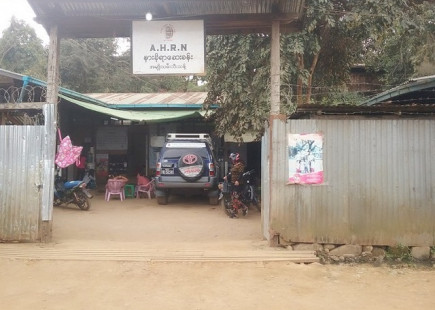
Photo credit AHRN Myanmar
Women who use drugs, as well as sex workers, and women from low-income background make up the majority of these visitors, although the centre is specifically targeted for women who use/inject drugs, especially in light of the limited availability of health services in the region. Women can come to the centre anytime it is open, obtain any available services they need for free, and leave as they wish.
“If you are a person who injects drugs, you can simply go to the counter and get needles. If you are not using and just want condoms, you just go and get the condoms from the counter. If you feel like taking a rest for a while [due to withdrawal], we have pain management services as well.” – Thinzar Tun
More than just a drop-in centreHpakant is a township in Kachin State whose majority migrant population relies heavily on jade and gold mining. “It’s not that easy to get jobs, even for the graduates,” said Ms. Tun as she explained why prostitution and illicit drug use flourish, and why they are often associated with risky behaviours due to the lack of public services in the area.
Socioeconomic hardship is a crucial factor which inspired the development of another unique programme at the centre. For women who face difficulties making ends meet, this DIC offers daily paid jobs for 20 women, ranging from packing paraphernalia packages for AHRN Needle Syringe Program to cleaning.
Mothers are also free to bring their children who can play at the back of the building. If needed, women can even do their laundry, take a shower, and enjoy haircutting services at the centre. As summarised by Ms. Tun, “at the end of the day, you have some income, you have your clothes washed, you could take care of your kids, and you are welcome to join the centre’s daily movie and tea sessions.”
“I always feel something when I enter [the centre]. There are interactions, you know,” and “there is a sense of belonging, sense of ownership,” said Ms. Tun when asked about the significance of this DIC.
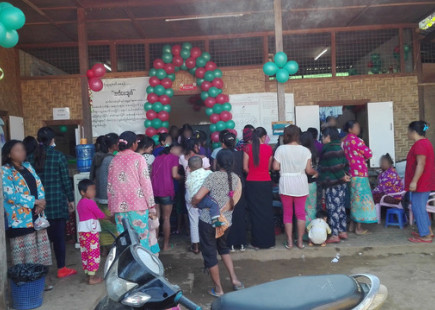
However, running women-friendly centres such as the one in Hpakant requires substantial funding, which has become exceptionally difficult to obtain in this period of weakening institutional and financial support for harm reduction services across the globe. Besides reaching out to and providing assistance for women in the community, resources are also needed to support partnerships and maintain relationships with the local hospitals on which the DIC largely depends for its medical services.
"Being a woman itself is something"So why was there a need to establish a women-only centre in Hpakant? “Being a woman itself is something”, as Ms. Tun asserted, let alone using drugs or working in the sex industry in an area with such limited socioeconomic opportunities. Earlier, women were able to access services from ‘regular’ drop-in centres, but the lingering stigma surrounding drug use and sex work was so pervasive that it remained challenging for women to find adequate medical and psychosocial support.
In the context of Hpakant, a women-only drop-in centre has proved to be effective not only in reducing the harms associated with drug use and other risky behaviours, but also in serving as a hub for women to help, empower, and connect with each other.
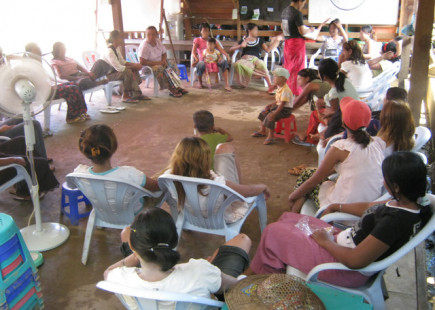
As expressed by Ms. Tun, the extent to which Myanmar’s new drug policies will reflect gender-specific needs largely remains to be seen. “The interesting thing is that these policies also mention harm reduction, which were never written before, so it’s actually a good sign. But we do not know how much it will be reflected in the strategy.”
Nevertheless, local experiences and achievements like those of Hpakant’s women-friendly DIC will lead the way towards more humane, health-oriented drug policies, and towards policies whose design and implementation are based on meaningful participation by local communities. “We have to wait and see. For now, we have to do what we can with the available funding,” concluded Ms. Tun.

